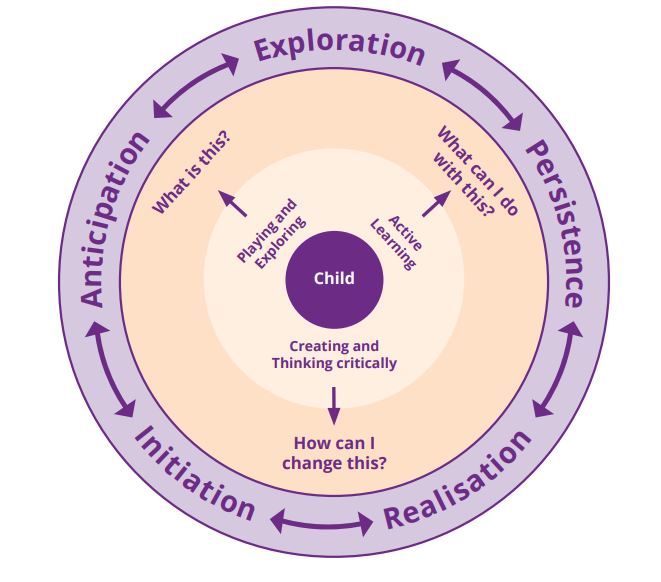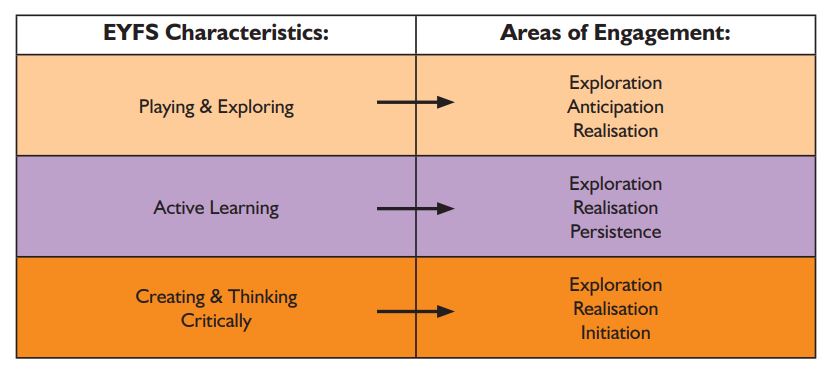EYFS Overview
Early Years education is concerned with the physical, social, emotional, aesthetic and intellectual development of the individual child, with no one area standing in isolation from the others. We base our learning on golden threads and foundations for learning as the basis for the curriculum in the Orange Phase. It encompasses the transition from the Early Years Foundation Stage Curriculum through to Key Stage 1 and early Key Stage 2 for students that is appropriate. Students will then progress on the most appropriate pathway in order to suit their needs when developmentally appropriate. Staff are adept to the needs of the children and tailor the learning according to their needs and individual interests. We value contributions of learning from home and encourage parents to contribute any WOW moments or learning outside of school via our Evidence for Learning app. Learning is a partnership between home and school.

Students progress and next steps in learning is informed by using the Equals EYFS framework as this is most developmentally appropriate. This is in collaboration with students individual EHCP outcomes.
Children learn key skills and knowledge focused on golden threads in the curriculum according to their level of development. We identify 'Foundations for Learning' which are woven into our teaching and learning and include the things that we want our children to know, experience and be able to do. The learning is sequenced into clear progress steps which are used to plan our provision, routines and teaching. The children's learning is enriched by trips and visits, walks in the local community, visitors to the school and additional experiences and therapies. There is a mixture of sensory learning, practical and meaningful activities all tailored to each individuals needs. We work closely with Speech and Language Therapists, OT's and Physiotherapists and have access to Music Therapy if required. Students also have access to Rebound Therapy, Hydrotherapy and Riding for the Disabled on a referral basis.
In order to teach reading we use the Read Write Inc program. This is supported by the use of multi sensory approaches to teaching synthetic phonics. Some students require a blended approach to learning as we recognise that all students learn in different ways. Children are also encouraged to take books home to share.
There are four areas of learning within the framework. These areas align with our pathway areas which allow for a natural transition of learning when pupils come to the end of the Early Years Foundation Stage.
My Personal Social and Emotional Development
My Cognition and Learning & Characteristics of Effective Learning
Click on each of the titles so that you can see an overview of the learning areas that we use to inform progress and development.
These skills maps are designed to support teachers in their day-to-day observations in order to recognise and record some of the key early skills and/ or experiences in each of the Prime areas of learning, as well as the Cognition and Learning and EYFS Characteristics. The statements in each skills map are intended to be used as a guide to focus observations to inform students next steps in learning and develop increasing independence over time.
There are strong links between cognition and learning and the EYFS Characteristics of Effective Learning. Developing these firm skills in the early years helps to develop strong levels of engagement as learners move on to other other pathways.
Skilled staff make ongoing observations of learning which then contribute to the planning of students next steps. All observations are recorded on Evidence for Learning and are linked to our curriculum framework so that we can track progress according to the Equals frameworks in the following areas:
My Communication and Language
My Personal Social and Emotional Development
My Physical Development
We use the following cycle to inform our practice:
Look ---> Listen ---> Note ---> Plan --->Deliver
This continuous assessment cycle means that engaging and stimulating activities are constantly being developed in order to challenge our learners.
We aim to develop independence and fluency in our learners to ensure they are confident individuals who are prepared for the world around them. We measure levels of independence in each area of learning using the following scale:
This ensures learners are well prepared for the next pathway.
Please view the overview of the Orange EYFS phase and more information in the flip book:
Early Years Curriculum Orange Phase Long Term Plan
Preparing for Adulthood
We believe that preparation for adulthood is a theme to develop right through the school from our youngest learners to those about to leave at the end of their school career. Throughout the EYFS curriculum we continually teach and develop our learning value Independence to ensure our students will be fully ready for adult life.
Preparing for Adulthood and developing key life skills are a key part of the curriculum for all Highfield pupils. These skills are embedded within each of our pathways and taught at the most appropriate level for the learner. This is the basis for our work related learning strategy and as our strap line states it prepares learners for the next step in education, life or work - whatever is appropriate for them.
Careful and highly individualised curriculum planning across the school is related to students EHCP Outcomes and a bespoke curriculum framework. Many of these objectives run throughout the Green pathway curriculum. It aims to give all pupils the opportunity to experience and learn to prepare for real life situations, such as shopping, crossing the road, meal planning, writing a letter and posting it, or even growing and eating their own food. Take a look at our strategy and how we incorporate this into our curriculum below:
EYFS Orange Pathway End Points and Transition
Outcomes for learners in the EYFS pathway vary according to the individual progress they make in their time at Highfield through the curriculum frameworks and against their EHCP outcomes. However all students are entitled to leave with qualifications in at least Maths, English, communication and one other curriculum area. In the green pathway we use ASDAN Life Skills Challenges as the qualifications base. Students also have recognition of achievements through the AQA Unit Award Scheme.
Learners in the EYFS Orange pathway are likely to stay on Highfield roll until the end of the year they are 19, unless there is an alternative placement that would suit the individual's needs better than continuation at Highfield. Some students who transition from Early Years on to the Yellow pathway may leave to pursue a college course tailored for learners with additional needs. Once students have become sufficiently independent and developed their learning behaviours in the EYFS teachers will use their assessments to transition learners on to the most appropriate pathway to meet their needs.


